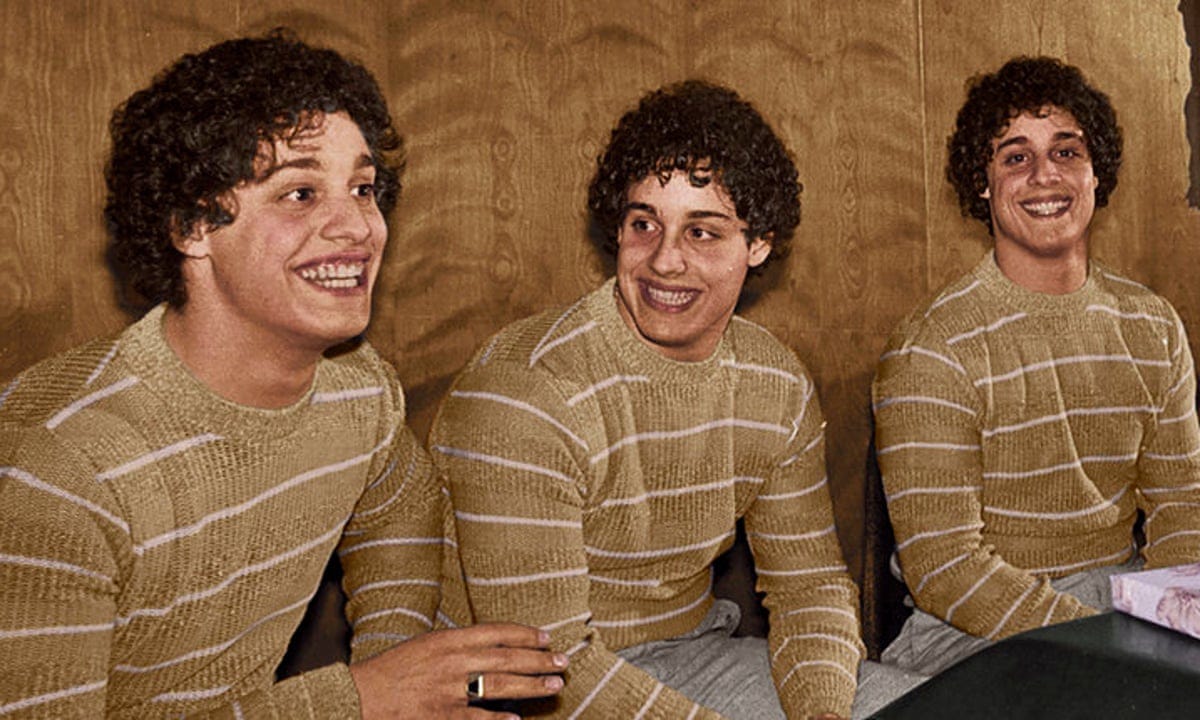Imitation
and authenticity

We do it to others, but we generally don’t enjoy when it's done to us...
You remind me so much of my friend so-and-so... I can't get over it!
You're identical. It's freaking me out how similar you are...
What happens is that something about someone — their mannerisms, their unique cadence when they speak, their laugh — reminds you of someone else — someone you know and love.
But why is it that the person you're sharing this with is never as excited as you are?
Shouldn’t they be thrilled that you found their doppelgänger!?
Yet, they're not.
Why does it irk people so much to not be considered one-of-a-kind?
As much as we sometimes fall into the trap of thinking that we’re unique because we’re the only ones who match their socks with their eyeglass frames, or the only ones who listen to 1990's Hungarian punk rock, or because we are the leading experts in the world in the field of the political economy of salmon farming — deep down, we know that our individuality runs way deeper than any one of the outwardly obvious quirks we may possess.
This is a good thing. Were it to happen, one day, that you bump into another person in your trendy corner of the world that also matches their socks with their eyeglasses, you would still remain you.
This would not qualify as identity theft.
Even your most unique quirks are not what really make you you. Rather, these quirks emerge from your true source of uniqueness in the depths of who you are (aka your soul).
In Jewish consciousness, who we are is like the colors of the spectrum. There is only one of every shade of the rainbow. So too, there is only one of you.
This is the reason why no one can truly ever encroach on your you-ness. Being yourself is letting your unique color of light shine through you. To deny yourself this expression, or to try and be like someone else is, in an important sense, a grave sin.
To be ourselves — our true selves — and only ourselves — is the essential reason we're here.
As the book of Genesis comes to a close, Jacob is on his deathbed, surrounded by his twelve children, each one so different from the other. One is naturally a scholar. Another, a leader. Another, has business sense in his bones. Each one receives his unique blessing to bring to fruition his unique soul.
The scholar — that he should have strength to apply his wisdom to study diligently. The leader — that he should be a leader at every stage of his ascent to leadership. The merchant — that he should inherit the coast, and merit to support good causes with his hard-earned money.
"[Jacob] blessed each one according to his blessing" — he blessed the gifts they were already blessed with to come to their full-blown expression.
Blessings are not magic pixie dust that make you into something that you're not. The word for blessing "bracha - ברכה" is related to the word “bereicha - בריכה,” which means "wellspring" of water. Like water poured on a seed, blessings brings to blossom the DNA of potential that is latent in the seed. It doesn't mutate it.
Sometime, not only do we need the watering of our spiritual DNA, but we need the inauthentic husk removed because it is blocking our growth. Jacob blessed Shimon and Levi with harsh words of rebuke pushing them to take off their masks and be themselves. When he chides them for their acts of aggression that were out of line, he prefaces it with a separate indictment of their inauthenticity: "a stolen craft is your trade," he tells them. Who are you trying to be? Where did you get that violent reaction from?
We don't always know why we act the way we do — why we speak the way we do. But we know for a fact that we absorb influences from all over the place, whether it be friends, acquaintances or TV or whatever it may be. Without realizing it, these things change us.
We also know that the people we know who have great blessing in the world have in some way tapped into their unique. They found their voice and sang with it. They discovered their style (as bizzare as it may have be) and rocked it. They had a revolutionary idea, and against the naysayers, ran with it. Every person has something unique to bring to the world — something only he or she can bring — something the world needs from them. What you have is irreplaceable.
It's a life-long journey to dig deep and find inside ourselves what makes us ourselves, but as we find it, we draw down the blessing that brings us to blossom in the way only we can.
This is the image that we're left with as the Jewish family is poised to become the Jewish people in Egypt. Before we become a mass of millions of Jews, we are shaken and awoken to what unity looks like. Unity is not uniformity. Unity is not a melting pot of grey. Unity is the many colors of Jacob's children united at his bedside. This rainbow of colors — the image of Jewish unity — is reflected two centuries later by the many colors and patterns that decorated the flags of their children — the twelves tribes united around the Temple in the desert on the way to the Promised Land.
This is the light we're striving to shine today. A full spectrum of difference. United in our source and united in our purpose, but with many ways to get there. With no jealousy or pressure to be someone we're not. Every individual has their unique place.
From white light we will shine all the colors under the sun.
This piece is based on an essay by Rav Yerucham Levovitz zt"l, based on a lesson drilled into him by one of his teachers, Rav Nosson Tzvi Finkel zt"l the Alter of Slobodka, whose life mission was raising individuals to shine their own, special light, and do the same for others.





